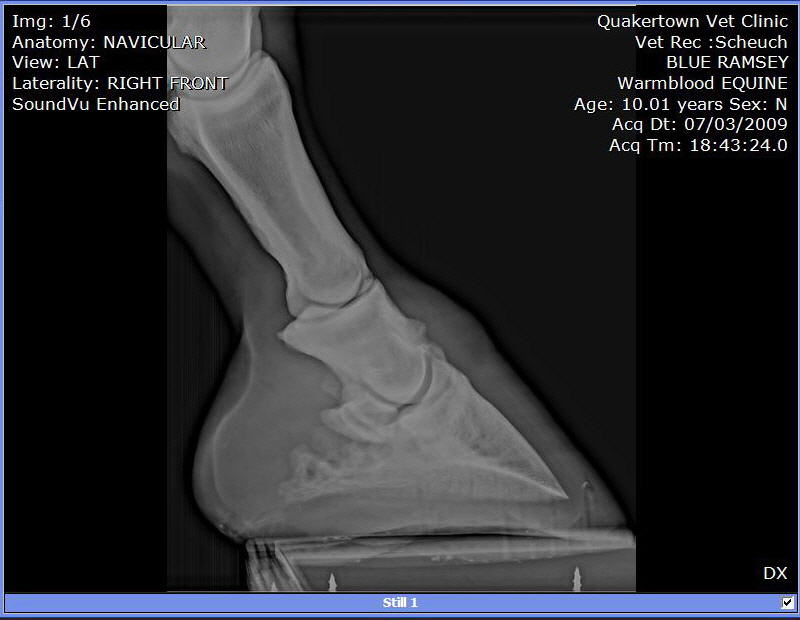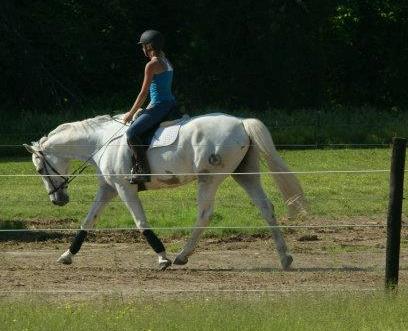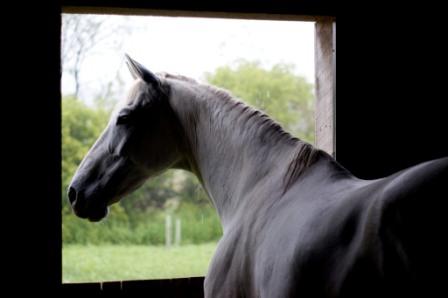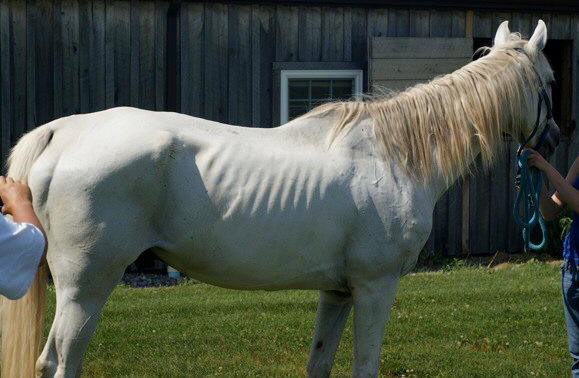Site Menu:
| This is an archived Horseadvice.com Discussion. The parent article and menus are available on the navigation menu below: |
| HorseAdvice.com » Diseases of Horses » Lameness » Joint, Bone, Ligament Diseases » Diseases of joints, bones, and ligamens not covered above » |
| Discussion on Joint injections to make the horse "feel good" | |
| Author | Message |
| Member: jhyrick |
Posted on Saturday, Oct 27, 2012 - 2:52 pm: Is it me, or do you find that trainers of performance horses have been sold on the idea of joint injections to make the horse "feel good"? I was really upset to find my 4 year old horse had HA/Steriod injections, though she had no signs of OA (had pre-purchase x-rays done a few months prior).I work with human pain management. Though not a physician, I had years of animal anatomy and physiology, human (the same) and later chose business aspect of the heath care industry. I continually learn, as I am working intimately with interventional pain physicians. For the horse world, it appears that injections have replaced icing for mild inflammation from over work situations, and/or joint are injected with greater risk than a systematic injection of steroid if they feel inflammation is in more than a single area. In human medicine, steroids are treated with great caution...endocrine complications, additional degeneration of cartilage, retardation of other healing, etc. I have read some of your other writings on injections, but I hope that re-opening this as a new subject, you can help to educate the horse owner about what to say to a trainer that pressures a client to allow for injections to "give the horse a better chance". I was not given an option, just received the bill later. BTW - I have degenerative knee disease, and when really uncomfortable, I will have an HA/steroid injection. But - I am degenerative with OA, and it doesn't make me "feel good", but after about 3 days of pressure in the joint, it feels better. Joni Hyrick |
| Member: always |
Posted on Saturday, Oct 27, 2012 - 5:06 pm: I personally would not leave my horse with a trainer who had this philosophy. If the trainer was adamant that even a young horse such as you describe needed these treatments, I would find another trainer immediately, because to me it indicates the horse is being pushed and over-worked, and therefore the trainer is not a real horseman. |
| Member: jhyrick |
Posted on Saturday, Oct 27, 2012 - 10:07 pm: Thank you, and I agree. However, I have yet to meet a trainer at the national level, that is not convinced injections need to be done. Some drug company has done their job in marketing efforts.The horse is no longer with the trainer. It's now a standard amendment to any contract that vet work that is not a response to a life threatening situation must be pre-approved. The point I hope to make here is not about trainers. It's about injections, and the lack of education about them. Every owner needs to be trained, and trainers need to be further educated. I'd love a few sentences that I could cut and paste from Dr. O. |
| Member: rtrotter |
Posted on Saturday, Oct 27, 2012 - 11:05 pm: I come from a racehorse background and I have been a standardbred owner, trainer and breeder for over 35 years, I also work for a very high profile trainer (Office manager) so I believe I can chime in here because racehorses are very high on the list of performance horses. Most trainers as a matter of course use joint injections and they start as young as two years old.There is a lot of money on the line to both train young horses down to race times and to keep them sound as they do it. Whenever that much money is on the line, sometimes the horse loses out. Instead of getting turned out to mature they are subjected to injections in an effort to keep them comfortable. For my own horses, I have taken a different stance. I do not believe in joint injections unless there is nothing else that can be done, I have seen too many horses ruined because of this practice due to infection and indiscriminate constant injections by vets. Owners are usually never asked if they want their horse's injected, the trainer makes the decision. My view is very different and very unpopular in racing circles because I do not inject joints on my horses. My race mare who is going to be 8 in January and has over 115 lifetime starts has never been injected (I have had her since she was two). She also races cold meaning no pre-race medications(except lasix) and has raced that way her whole life. To what do I attribute this to. There are several reasons. 1) She is managed to avoid all the usual problems that plague most horses. She is turned out every night all night and moves(jogs/tows etc) almost every day. 2)She is not raced if she has a problem, we take care of the problem with time and rest. 3) She is fed a balanced diet with no sugar or preservatives. 4) She is raced in a class where she can be competitive without getting abused every week.and if she ever gets to the point where where this is no longer the case, she will be retired. 5)and most of all because she is not dependent on either injections or pre-race drugs, she does not go through the up and down withdrawal/feelgood issues that I think most other racehorses go through and what I feel leads to premature retirement because eventually the treatments no longer work. I put the good of my horse above the making money issue, but not many people do this. I can try to change others but in the long run as long as I make the right decisions for my horses that's about all I can do. I apologize for the long response but this thread really hit a nerve. |
| Member: mrose |
Posted on Sunday, Oct 28, 2012 - 11:35 am: I'm with Trotter. I just turned down a mare I was looking at because at the age of 5 she'd been on hock injections since age 2 - plus they had her on a Regumate implant.One of our stallions, 19 next yr, has no hock issues and has been competing in trail, hunter,western pleasure and dressage since age 3. Good care and common sense imo prevail. Our older stallion, retired last year at age 22, did start to get some hock issues ( he did reining, dressage and trail in his lifetime) and we didn't hesitate for him to get injections. I believe they've helped him quite a bit. It often seems like trainers latch onto anything they think might give them an edge. And, with the money usually involved, I guess you can't blame them. It's up to the owner's to say "no." |
| Member: divamare |
Posted on Sunday, Oct 28, 2012 - 5:28 pm: Ditto Rachelle and Sara...$ is the root here and competitors trying to gain an edge. Sadly, it will always win out IMHO w/ the majority. Too much money on the line at the top level for sure. As for the lower levels...perhaps horses are not as skilled, well bred, etc., and the medication gives an edge...or a temporary band aid of an edge. The horse loses all around IMHO. However, education will certainly help some folks make an informed choice at the very least. Too much money on the line at the top level for sure. As for the lower levels...perhaps horses are not as skilled, well bred, etc., and the medication gives an edge...or a temporary band aid of an edge. The horse loses all around IMHO. However, education will certainly help some folks make an informed choice at the very least.
|
| Member: gramsey1 |
Posted on Sunday, Oct 28, 2012 - 6:53 pm:  10 year old performance horse, jumped into the ground. After, a few years barefoot, and on pasture rest, he is comfortable again. He doesn't have the survival instinct to buck a rider off when he is in pain. He just does his best to perform. He lives to perform. Why would anyone shoot a horse like this up? To make him feel better? Really? |
| Member: gramsey1 |
Posted on Sunday, Oct 28, 2012 - 7:22 pm:  He how he looks today, but it was a long haul. Note the nasty brand redo; somebody wanted to hide is past. Rescued from a kill pen by a buyer that saw something special in him. You obviously get it. Isn't it nice to know your horse won't end up destroyed, looking for a lucky break? One can only imagine what he could have been, if owned early, by someone like "R" Trotter friend. |
| Member: gramsey1 |
Posted on Sunday, Oct 28, 2012 - 7:45 pm: Didn't see the discipline, what are you training for? I know Dressage and Jumper people in Eastern Pennsylvania and Northern Maryland. They'll take you as far as you want to go. |
| Member: gramsey1 |
Posted on Sunday, Oct 28, 2012 - 7:54 pm: Oh, here is the before shot. Don't really know what the kill buyer saw. But, he was right. We have been blessed to own him. And we would have never known the privilege of caring for a noble horse like this, if some trainer had been as caring as you seem to be. |
| Member: gramsey1 |
Posted on Sunday, Oct 28, 2012 - 8:19 pm: Joni,I just looked at your webpage. Prior to purchasing our little farm, we boarded at Travelda in Pleasant Valley Pa. Their horse Willie, now William did really well in national competition. I seriously doubt they injected him as a matter of routine. https://traveldafarms.net/breedingsales https://www.huffingtonpost.com/2012/05/16/horse-runs-into-sea-rescu_n_1521798.htm l |
| Moderator: DrO |
Posted on Monday, Oct 29, 2012 - 5:21 pm: Hello JG,I do not do joint injections of any kind on sound horses with no signs of arthropathy. I cannot believe that a healthy joint's environment can be improved by introducing a foreign substance no matter how physiologic it is supposed to be. Nor is there any work to recommend the process. Combine this lack of support for the procedure with the risk of complication, admittedly very low, and it just does not make sense. DrO |
| Member: jhyrick |
Posted on Tuesday, Oct 30, 2012 - 1:42 pm: Thank you all for confirming how I feel about the joint injections. Yes, my love is for all horses, though Arabian horses and all their various disciplines has been my passion.I just wish I could educate those owners that are allowing routine injections, that it is not what they want for their horses. Joni Hyrick |
Horseadvice.com
is The Horseman's Advisor
Helping Thousands of Equestrians, Farriers, and Veterinarians Every Day
All rights reserved, © 1997 -
is The Horseman's Advisor
Helping Thousands of Equestrians, Farriers, and Veterinarians Every Day
All rights reserved, © 1997 -
